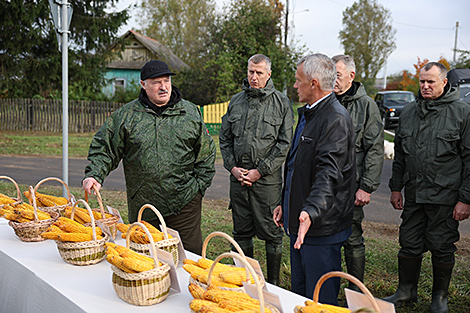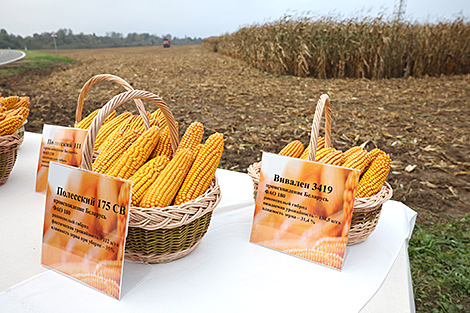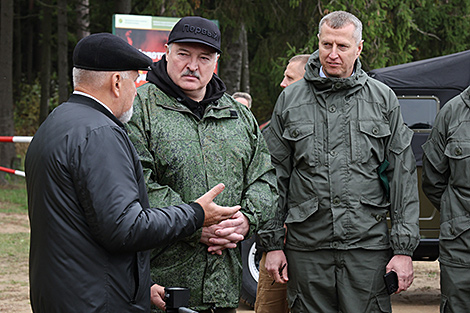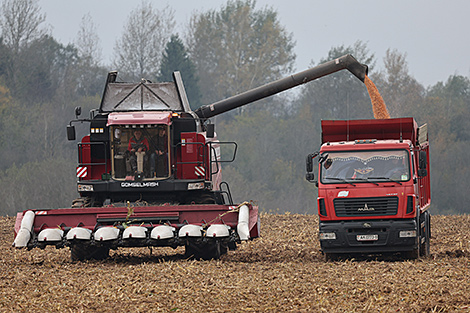News & Events in Belarus
Lukashenko examines results of maize cultivation experiment

SHKLOV DISTRICT, 11 October (BelTA) – Belarusian President Aleksandr Lukashenko examined the results of the experiments on maize cultivation as he visited his hometown on 11 October, BelTA has learned.
For the experiments, the Aleksandriyskoye agricultural enterprise planted 12 varieties of grain maize this year, including six of domestic selection and six of foreign one. Foreign varieties are planted primarily for grain, while domestic – for silage.
The president was informed that the enterprise achieved quite good results for all maize varieties, provided that all technology requirements were met. Scientists assured that in general the harvest of grains planted for various purposes was comparable."You always say that the most important thing is dictatorship in technology. Everything has been done as you said. This dictatorship allows us to fulfill the potential of both silage and grain hybrids. We are not behind in terms of yield," director of the Polessky Institute of Horticulture Leonid Shimansky said. "Currently, we are competing with over 30 foreign companies in maize selection. There is no such competition for any other crop. I think we will maintain this level."
However, there is still a certain difference. Foreign varieties are earlier in terms of maturity than Belarusian varieties. Domestic varieties have high grain yield, but it is sometimes lower, up to 20%, compared to foreign ones. In general, the work on improving Belarusian varieties is going faster every year. Over the last ten years, the performance of varieties has increased by a quarter.
"Our maize is not bad, it is true. But we are lagging behind the West," Aleksandr Lukashenko stated.



The president stressed that he expects ideas from scientists, and this applies not only to agriculture but to the scientific sector as a whole. "You must give results. I have been working with you for decades. We will look into this in the near future. The commission at the National Academy of Sciences is working. Now they start complaining. Why? The Commission consists of scientists and is taking a very close look at the academy. I want to have a closer look at the personnel: whether or not we continue to work with these heads of institutes and other workers. We will talk about this. You should be ready to report about all crops," the head of state said.
He recalled that once he agreed with the proposal not to rely solely on domestic seeds and varieties and to import at least about 15% so that there is an opportunity to compare.
"There should be no window dressing and facile optimism. Why should we cultivate the poor-yielding varieties? We need highly-productive good varieties. But we need to take a serious look at the results, especially in terms of these varieties. Our varieties are lagging behind, despite the great attention we pay to science," the Belarusian leader said.
As it was noted during the event, it makes economic sense to cultivate highly productive imported varieties of grain maize only in advanced farms. Most of the agricultural enterprises in Belarus can work quite successfully with domestic ones, especially when it comes to silage. But if all technologies are followed, farmers can also get high yields of grain maize. It is necessary to consider the increase in the capacity of the two maize calibration plants operating in Belarus. The areas planted to crops have grown significantly in recent years, and therefore, it is sometimes necessary to buy foreign seeds even for silage.
In general, Aleksandr Lukashenko is convinced that maize should be grown in Belarus. He also believes that Nikita Khrushchev, the former leader of the USSR, was right to promote this crop. "If maize had not been grown on a large scale at that time, there would not have been enough fodder for livestock," he stressed.







 print version
print version make home page
make home page add to bookmarks
add to bookmarks

